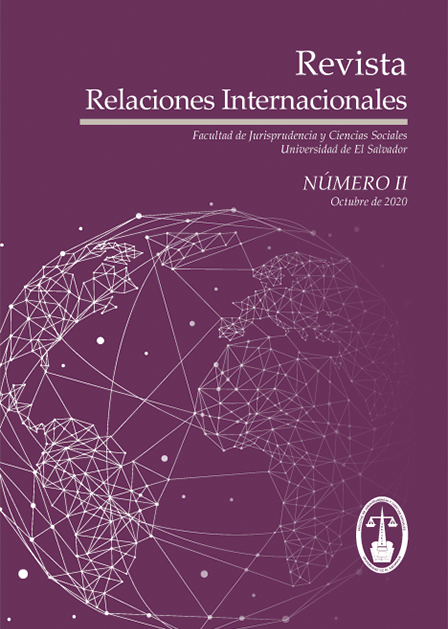Fortuna, occasione e virtù: a reading from Machiavelli’s approach about the results of the presidential elections in El Salvador in 2019
Keywords:
Polarized pluralism, Ideological distance, Bipartisanship, Political parties, Fortune, Occasione, VirtùAbstract
In recent years, the political context in El Salvador has been influenced by the prevalence of a polarized pluralism affected by the ideological distance between both major political parties, same that have carried out the elections since the signature of the Peace Accords thus far. Nevertheless, during the presidential elections in 2019 the traditional pattern was broken, since Nayib Bukele gets into the power under the banner of a political party that is not included in the described pattern.
Under this new political reality prevailing in the country, this article seeks to explain from the political theory, particularly from the interpretation of Niccolò Machiavelli, those elements that allowed the current president of the Republic to come to power, as well as the aspects that he should take into account so that the changes he makes last over time. For this, the essential concepts of Machiavelli’s theory such as fortune, occasione and virtù are addressed, since they are present in his most outstanding works such as The Prince, The Art of War, The Discourses on Livy and The Life of Castruccio Castracani of Lucca.
Downloads
References
Álvaro Artiga-González, El Sistema Político Salvadoreño. (El Salvador: Programa de las Naciones Unidas para el Desarrollo PNUD, 2015), 244. http://www.aecid.sv/wp-content/uploads/2015/11/EL_SISTEMAPOLITICOSALVADORE%C3%91O.pdf
Código Electoral. (El Salvador: Asamblea Legislativa de El Salvador, 1933). https://www.tse.gob.sv/documentos/normativa-electoral/Codigo-Electoral-de-El-Salvador.pdf
El Faro, periódico digital, “La manipulación de Nayib Bukele”, El Faro, 12 de diciembre de 2018, acceso el 09 de marzo de 2019.
Fernando Vallespín y otros, Historia de la Teoría Política 2, Estado y teoría política moderna, (Madrid: Alianza Editorial, 1995), 84.
González, “El sistema de partidos en El Salvador” (1982-1994), Realidad: Revista de Ciencias Sociales y Humanidades, n.39 (2004): 443-458. https://www.lamjol.info/index.php/REALIDAD/article/view/5232
Jeannette Aguilar, “Elecciones 2015: ruptura institucional y desafección política”, Revista Estudios Centroamericanos ECA, n.740 (2015): 50.
Juan Manuel Forte Monge, Estudio introductorio, en Nicolás Maquiavelo, Il principe - Dell´arte de lla guerra - Discorsi sopra la prima deca di Tito Livio - Vita di Castruccio Castracani – Discursus florentinarum rerum. Traducido por Antonio Hermosa Andújar y Luis Navarro (Titivillus, 2017), 52.
Juan Manuel Forte Monge, Estudio introductorio. Maquiavelo. 121.
Luis Eduardo Ayala et al, Estado constitucional de derecho y democracia en El Salvador 2013, (San Salvador: Aequus Editorial, 2015),140-141.
Nicolás Maquiavelo, El Príncipe, Capítulo XXV, Edición bilingüe (Madrid: Editorial Tecnos, 2010), 247.
Sartori, Giovanni (1980). Partidos y sistemas de partidos, (primera parte), Madrid: Alianza Editorial S.A. Citado en: Álvaro Artiga-
Tribunal Supremo Electoral de El Salvador, Memoria de Elecciones. 05 de febrero de 2019.
Walter Araujo, “La estrategia de campaña que dejó como ganador a Bukele: Lo digital superó a los medios tradicionales y a las visitas de territorio”, El Salvador Times, 11 de febrero de 2019. https://www.elsalvadortimes.com/articulo/politicos/arena-fmln-subestimaron-poder-redessociales-abusaron-territorio-perdieron-tiempo-recursos-energia/20190207143230054771.html, acceso el 12 de marzo de 2019
William E. Marroquín, “Análisis de la turbulencia electoral en la elección presidencial del año 2014 en El Salvador”, Revista Estudios Centroamericanos ECA, n.740 (2015): 74-75.
Downloads
Published
Issue
Section
License
Copyright (c) 2020 Revista Relaciones Internacionales

This work is licensed under a Creative Commons Attribution-NonCommercial 4.0 International License.
The authors transfer the copyright rights in favor of the Faculty of Jurisprudence and Social Sciences of the University of El Salvador (through Aequus Editorial) to include their writing in Revista Relaciones Internacionales.








